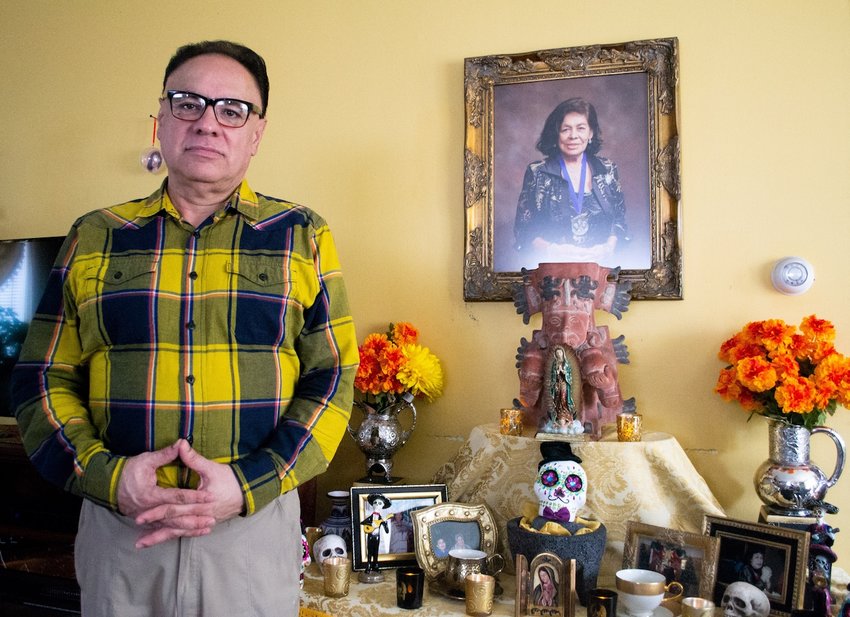
“It’s not Halloween.” No, there’s actually nothing spooky or macabre about Día de los Muertos, or Day of the Dead, at all. The centuries-old Mexican tradition, also widely celebrated by many Latino cultures, has a much more cheerful, rather than mournful, attitude toward the death of family and loved ones.
Lorenzo Lopez, a longtime Lansing activist and leader of several Latino and LGBTQ organizations, has already put up an ofrenda, a tribute to the dead, to his mother, Edelmira "Delma" Lopez, inside his home. It’s adorned with candles, sugar skulls and a figure of la Virgen de Guadalupe, and he plans to eventually include dishes of his mother’s favorite food and drink — “maybe a shot of tequila,” he laughed.
Lopez said the display is meant to uplift and inspire, despite its adornment with images of death.
“We, born and raised in the United States, think of skulls as something eerie, something scary. See the little man smiling? It is not to be anything to be feared,” Lopez said.
Casa de Rosado, a creative hotbed on Mount Hope Avenue which hosts exhibitions inspired and created by marginalized groups, is hosting its own three-day Día de los Muertos event this weekend. Guests will experience the whole gamut of the ancient tradition, including Aztec-inspired dance, a wide array of home-cooked dishes, mariachi music and, obviously, more than a dozen unique ofrendas — altars to the dead created by their family members and loved ones.
“The people involved will be dressed up in Aztec garb. They will use sonaja shakers and dance to Aztec music, and we’ll be identifying the four cardinal points of the earth,” Lopez said. “That’s the opening reception. After they do their piece, everyone in attendance, and those that have made an altar, will have a procession of all the ofrendas being presented that day.”
After the formalities, guests are invited to observe the fine details of the ofrendas and enjoy the music and cuisine. As Lopez explains, food is a huge component to the culture of Día de los Muertos. Particularly special dishes include Aztec chocolate, xocolatl, and a traditional bread, pan de muerto, or bread of the dead.
“The whole concept and tradition of Día de los Muertos is not only a celebration of loved ones that have gone, but it’s also about sharing,” Lopez said. “Food, of course, is a big part of human activity, so in this particular celebration, we’re going to be offering food, and you also can put food on your ofrenda.”
One of the everlasting symbols of Día de los Muertos are the oft-imitated, cheeky skeleton characters dressed in large dresses and tuxedos. The famous design was originated by Mexican artist José Guadalupe Posada in the late 19th and early 20th century.
The skeletons were originally intended to be seen as a satire of the upper class at the time.
Lopez said the tradition of Día de los Muertos has remained strong, thanks to its highly visible spot in pop culture, à la films like Pixar’s critically acclaimed hit “Coco,” and the endearing strength of Mexican culture, despite the risk of being lost to assimilation.
“Mexican traditions are extremely strong in the United States simply because it’s a border country. Parts of the U.S. used to be Mexico, which a lot of people don’t even realize” Lopez said. “As your community in this country becomes more politically aware, and begins to take positions of power, you go back to your own history and culture.”
Día de los Muertos at Casa de Rosado Free
Friday, Nov. 2, 4 p.m. Saturday, Nov. 3, noon Sunday, Nov. 4, noon Casa de Rosado 204 E. Mt. Hope Ave., Lansing (517) 402-0282
Support City Pulse - Donate Today!
Comments
No comments on this item Please log in to comment by clicking here